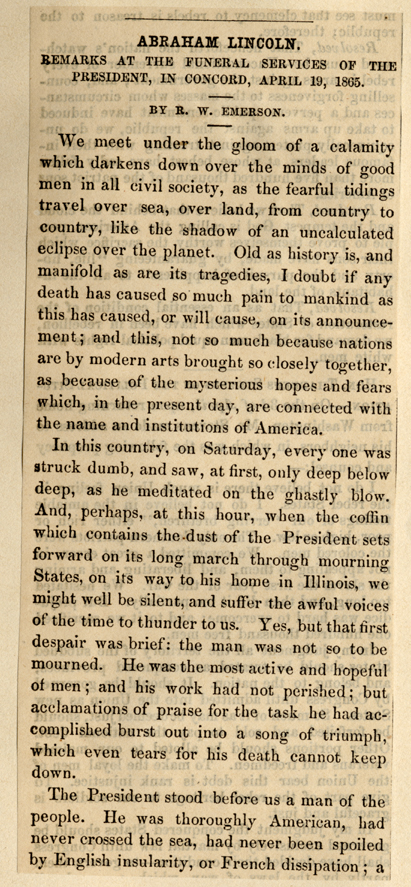 |
45.
Ralph Waldo Emerson. “Abraham Lincoln,” from the Commonwealth
(Boston), April 29, 1865. Myerson E167. Clipping in Volume
II of Uncollected Writings, a two-volume compilation of Emerson
pieces collected by William Taylor Newton. Letterpress on paper.
Uncollected Writings from the Emerson collection of William Taylor
Newton, presented by Edith Emerson Forbes and Edward Waldo Emerson, 1918.
In the 1850s and 1860s, Emerson participated in the political process to the extent that his involvement forwarded the cause of abolition. Moreover, although he did not care for the hullabaloo of party politics and did not approve of making popular heroes out of politicians, he was willing to recognize the worth and importance of a politician who conducted himself morally. Emerson voted for Abraham Lincoln, but he remained for a time unsure of Lincoln’s motivations and effectiveness. The Civil War began in 1861. Like other abolitionists, Emerson felt that its true purpose was emancipation, not the preservation of the Union. He could not commit himself to supporting the war wholeheartedly until Lincoln freed the slaves. Lincoln won Emerson over completely with his preliminary Emancipation Proclamation in 1862. From this point on, Emerson—who devoted considerable thought to the subject of great men—respected Lincoln’s greatness. On October 12, 1862, he delivered an address on the Emancipation Proclamation at the Music Hall in Boston. The address was published in the Atlantic Monthly for November, 1862. Emerson also willingly participated in Union fundraising and morale-boosting efforts. Lincoln was shot by John Wilkes Booth on April 14, 1865—a few days after the Civil War came to an end—and died the following morning. On April 19th (the anniversary of Concord’s role at the start of the Revolution), the town halted the business of ordinary life for three hours and held a funeral service for Lincoln at the First Parish. The order of services included an address by Emerson, who emphasized Lincoln’s particular fitness to the difficult role he had assumed: “This man grew according to the need. His mind mastered the problem of the day; and, as the problem grew, so did his comprehension of it. Rarely was man so fitted to the event.” In his address, Emerson also likened the power of Lincoln’s address at Gettysburg to that of speeches by John Brown and Kossuth.
No image in this online display may be reproduced in any form, including electronic, without permission from the Curator of Special Collections of the Concord Free Public Library. Previous Entry - Back to Section V Contents Listing - Back to Exhibition Introduction - Back to Exhibition Table of Contents |